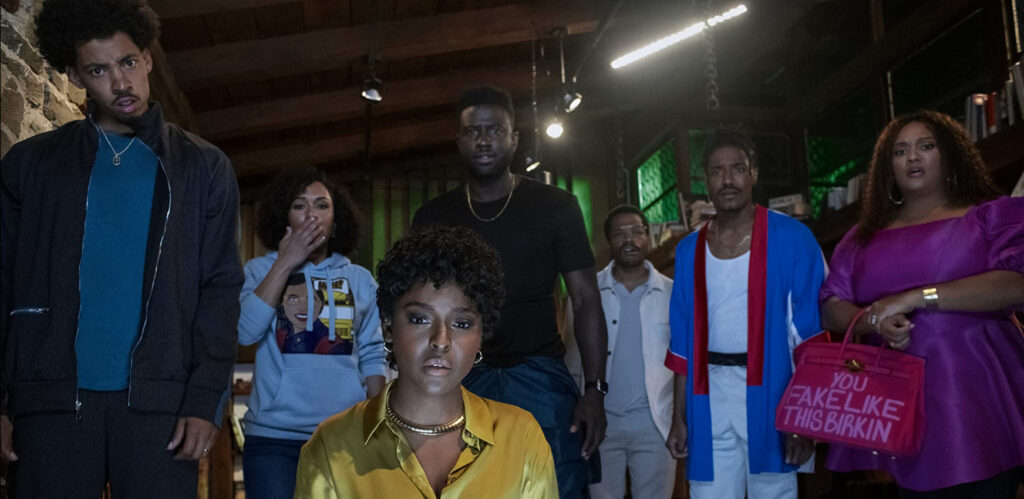“The Blackening” May be the Most Enjoyable Horror Film of the Summer

Few modern films have changed the horror landscape as abruptly as Get Out. Jordan Peele’s debut film uses a familiar horror narrative to explore the real life terrors of existing while Black in America. Part of the film’s genius is that it not only serves as deft and devastating satire of the dominant national culture, but it’s also an effective horror film in its own right. Get Out not only boosted Peele onto an international stage, but broke down invisible (and some very visible) barriers to creating mainstream genre films centering Blackness. Horror has always been at the forefront of political and racial progress, but Black actors have traditionally been relegated to thankless supporting characters or early victims used to demonstrate the strength of the monster. The practice of killing off Black characters first in slasher movies is so common that film scholar Robin R. Means Coleman used the trope in the title of her book The Black Guy Dies First: Black Horror Cinema from Fodder to Oscar.
With the tagline “We can’t all die first,” Tim Story’s The Blackening confronts this problematic legacy with a hilarious and scathing horror comedy that feels like a spiritual successor to Get Out and Peele’s third film Nope. The story follows a Juneteenth celebration in a remote cabin in the woods. A decade after their college graduation, eight scattered friends reunite for a weekend filled with drugs, drinking, and high stakes Spades tournaments. When they stumble upon a sinister room featuring a racist board game called The Blackening, the group is pulled into a nightmarish test where they must prove their Blackness to avoid certain death.
The Blackening exists firmly in the horror comedy subgenre. Ostensibly a murder mystery, the film opens on an unnerving sequence in which the first couple to arrive, Morgan (Yvonne Orji) and Shawn (Jay Pharoah), stumble upon the offensive game and the masked killer operating it from behind the scenes. They not only lose the first round, but their bodies become examples used to convince their friends to start a game of their own. Several sequences are indeed horrific and the film contains more than a few effective jump scares, but like the best horror comedies, Story never loses track of the light-hearted tone. We’re afraid for the characters and believe that they are in real peril, but never so much that we lose our ability to laugh at the buffoonish killers or the devastating one-liners tossed off by our protagonists.
Story does reference the lack of substantial Black characters in horror and their tendency to die in early scenes, but the film reserves most of its references for more generalized Black culture. Nods to sitcoms and movies abound as well as classic film quotes and beloved lyrics. Story infuses the narrative with a distrust of law enforcement and suspicious outsiders without villifying the core group for wanting to stick with their own. Alongside the masked murderers, Story reveals the very real dangers faced by Black people on a daily basis without reveling in tragedy. Aside from a clever nod to the opening of Scream 2 that serves as a deft bit of foreshadowing, the film does not really deconstruct horror tropes except to present them from a Black perspective. Sure, there are some glaring plot holes and suspicious off-screen deaths, but we’re having way too much fun to really care.
What the film lacks in slasher meta-commentary, it more than makes up for in comedy. The Blackening features a stacked cast filled with hilarious actors and comedians fully committed to the rapid-fire quips and whip-smart diologue. Co-written by Tracy Oliver and Dewayne Perkins, the script does not hold back nor does it cater to a white audience who won’t understand many of its jokes. Black pride exudes from every frame and at times the movie feels more like a conversation with the audience rather than a piece of isolated art. Ostensibly representing the kind of stereotypical characters who usually die in slashers, each character is a complex human being with an exterior life that can be felt in every scene. All six get a moment to shine and demonstrate their worth in different but equally valuable ways.
Strong chemistry between the cast translates to the screen and the The Blackening plays out like the best kind of hangout film. Lisa (Antoinette Robertson), Dewayne (Dewayne Perkins), Allison (Grace Byers), King (Melvin Gregg), Shanika (X Mayo), and Nnamdi (Sinqua Walls) are the cool kids we all want to be friends with and Story uses this party vibe to pose a larger question about what Blackness actually means. Without revealing too much about the film’s somewhat predictable conclusion, Story allows the question air to breathe. He presents the reality of this consideration without demonizing any of his characters for asking it or forcing anyone to come up with a satisfactory answer.
The Blackening is not a flawless film or even a terribly scary movie. Genre elements are pretty straightforward and the group does not spend much time mourning those who fall along the way. Though not as successful or concise as Get Out, Story’s film is the next in a line of important horror movies that explore an increasingly divided culture and a world in which it’s still not safe to be Black in America. Though important, The Blackening is also incredibly fun. Like the best kind of horror comedies, it wears its commentary on its sleeve and skewers ridiculous tropes that have reigned supreme for far too long. See it in a crowded theater and have fun singing, shouting, and laughing along.
Jenn Adams is a writer, podcaster, and film critic from Nashville, TN. Find her social media nonsense @jennferatu.